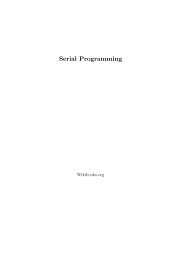- Seite 1 und 2:
Soziologische Klassiker Wikibooks.o
- Seite 3 und 4:
Inhaltsverzeichnis I. Thematische E
- Seite 5 und 6:
Inhaltsverzeichnis 13.2. Historisch
- Seite 7 und 8:
Inhaltsverzeichnis 24.4. Werke und
- Seite 9 und 10:
Inhaltsverzeichnis 35.8. Internetqu
- Seite 11 und 12:
Inhaltsverzeichnis 46.7. Internetqu
- Seite 13 und 14:
Inhaltsverzeichnis 59.2. Historisch
- Seite 15 und 16:
Inhaltsverzeichnis 70. Horkheimer,
- Seite 17 und 18:
Inhaltsverzeichnis 81.4. Werke . .
- Seite 19 und 20:
Inhaltsverzeichnis 93. Martineau, H
- Seite 21 und 22:
Inhaltsverzeichnis 104.6. Das Werk
- Seite 23 und 24:
Inhaltsverzeichnis 116.2. Historisc
- Seite 25 und 26:
Inhaltsverzeichnis 127.4. Werke . .
- Seite 27 und 28:
Inhaltsverzeichnis 138. Steinberg,
- Seite 29 und 30:
Inhaltsverzeichnis 149. van Gennep,
- Seite 31:
Inhaltsverzeichnis 160.7. Literatur
- Seite 35 und 36:
1. Das soziologische Dorf 1.1. Einl
- Seite 37 und 38:
• Neofunktionalismus 7 • Strukt
- Seite 39:
Der Einfluss von Weber, Durkheim un
- Seite 42 und 43:
Brain Drain Oftmals gehen technisch
- Seite 44 und 45:
Brain Drain Name Geburtsort Geburts
- Seite 46 und 47:
Brain Drain Hier wird Bezug genomme
- Seite 48 und 49:
Brain Drain innerhalb eines Tages m
- Seite 50 und 51:
Brain Drain bei seiner Antrittsrede
- Seite 52 und 53:
Brain Drain render Direktor des "In
- Seite 54 und 55:
Brain Drain Die "akademischen Kreis
- Seite 56 und 57:
Brain Drain sogar 1937 Mitglied der
- Seite 58 und 59:
Brain Drain • Sven Papcke 245 •
- Seite 60 und 61:
Brain Drain zur logischen Konsequen
- Seite 62 und 63:
Brain Drain Emigration und Exil Im
- Seite 64 und 65:
Brain Drain Sinn verborgen bliebe.
- Seite 66 und 67:
Brain Drain Goffman 300 zu zählen
- Seite 68 und 69:
Brain Drain (1) Der Einfluss in die
- Seite 70 und 71:
Brain Drain Das war vorteilhaft fü
- Seite 72 und 73:
Brain Drain Betrachtet man das Lebe
- Seite 74 und 75:
Brain Drain Veränderung der Intell
- Seite 76 und 77:
Brain Drain Ein weiterer Wegbereite
- Seite 78 und 79:
Brain Drain Für Dahrendorf definie
- Seite 80 und 81:
Brain Drain Wirkungsgeschichte der
- Seite 82 und 83:
Brain Drain • Robert K. Merton 41
- Seite 84 und 85:
Brain Drain Der wohl interessantest
- Seite 86 und 87:
Brain Drain • Langenbucher, Wolfg
- Seite 88 und 89:
Migrationssoziologie 3.2. Visualisi
- Seite 90 und 91:
Migrationssoziologie • Psychosozi
- Seite 92 und 93:
Musiksoziologie 4.2. Theory Map In
- Seite 94 und 95:
Musiksoziologie Frankfurt. • Ador
- Seite 96 und 97:
Musiksoziologie "Einführung in die
- Seite 98 und 99:
Soziale Ordnung aufweisen. Thomas H
- Seite 100 und 101:
Soziale Ordnung • Berger, Peter u
- Seite 103 und 104:
6. Der Begriff der Moral bei den Kl
- Seite 105 und 106:
6.3. Versuch einer Systematik 6.3.1
- Seite 107 und 108:
Literaturliste Berger 34 / Luckmann
- Seite 109 und 110:
Literaturliste "Medienethik - normb
- Seite 111 und 112:
7. Geschlechterforschung 7.1. Einle
- Seite 113 und 114:
• Zukunftsorientiertes Geschlecht
- Seite 115:
Teil II. Biographien 85
- Seite 118 und 119:
Adorno, Theodor W. • Zusammenarbe
- Seite 120 und 121:
Adorno, Theodor W. 8.4. Werke • K
- Seite 122 und 123:
Adorno, Theodor W. Der Zusammenhang
- Seite 124 und 125:
Adorno, Theodor W. bei. Dabei kann
- Seite 126 und 127:
Adorno, Theodor W. die völlige Auf
- Seite 129 und 130:
9. Alexander, Jeffrey 9.1. Biograph
- Seite 131 und 132:
auch in japanischer Übersetzung Da
- Seite 133:
Rezeption und Wirkung Soziologie an
- Seite 136 und 137:
Allport, Gordon W. tatsächlich vor
- Seite 138 und 139:
Allport, Gordon W. 10.4. Werke Allp
- Seite 140 und 141:
Allport, Gordon W. Zusammenfassend
- Seite 142 und 143:
Allport, Gordon W. Allports Motivat
- Seite 144 und 145:
Allport, Gordon W. der Phänomenolo
- Seite 147 und 148:
11. Archer, Margaret 11.1. Biograph
- Seite 149 und 150:
Werke Das Werk, im speziellen die T
- Seite 151 und 152:
12. Arendt, Hannah Abb. 12 Arendt a
- Seite 153 und 154:
Historischer Kontext • 1992: Ihre
- Seite 155 und 156:
Das Werk in Themen und Thesen • D
- Seite 157 und 158:
auch noch heute unvergessen und unb
- Seite 159:
• http://www.uni-oldenburg.de/are
- Seite 162 und 163:
Aron, Raymond • 1975-1976: Mitgli
- Seite 164 und 165:
Aron, Raymond den Menschen nicht da
- Seite 166 und 167:
Balla, Balint • 1955 erfolgt die
- Seite 168 und 169:
Balla, Balint Balint Balla zufolge
- Seite 170 und 171:
Balla, Balint Als erster Idealtyp g
- Seite 172 und 173:
Baudrillard, Jean 15.1.2. Besondere
- Seite 174 und 175:
Baudrillard, Jean 15.5. Das Werk in
- Seite 177 und 178:
16. Bauman, Zygmunt 16.1. Biographi
- Seite 179 und 180:
Werke • 1982: Memories of Class:
- Seite 181 und 182:
Das Werk in Themen und Thesen • D
- Seite 183 und 184:
Rezeption und Wirkung Ist Deregulie
- Seite 185 und 186:
17. Beck, Ulrich 17.1. Biographie i
- Seite 187 und 188:
Theoriegeschichtlicher Kontext von
- Seite 189 und 190:
18. Beck-Gernsheim, Elisabeth 18.1.
- Seite 191 und 192:
Werke • Mitmenschlichkeit als Ber
- Seite 193 und 194:
18.6. Rezeption und Wirkung Rezepti
- Seite 195 und 196:
19. Becker, Howard 19.1. Biographie
- Seite 197:
19.4. Das Werk in Themen und Thesen
- Seite 200 und 201:
Benjamin, Walter • 1940: Auf der
- Seite 202 und 203:
Benjamin, Walter dialektischen Betr
- Seite 204 und 205:
Berger, Peter • Max Weber hinsich
- Seite 206 und 207:
Berger, Peter Im Jahr 2000 erhielt
- Seite 208 und 209:
Blau, Peter M. Blau Peter Michael
- Seite 210 und 211:
Blau, Peter M. geht der Frage nach,
- Seite 212 und 213:
Blau, Peter M. Makrostrukturelle Mu
- Seite 215 und 216:
23. Blumer, Herbert 23.1. Biographi
- Seite 217 und 218:
Rezeption und Wirkung • Der dritt
- Seite 219 und 220:
24. Bolte, Karl Martin 24.1. Biogra
- Seite 221 und 222:
Das Werk in Themen und Thesen • D
- Seite 223 und 224:
25. Boudon, Raymond 25.1. Biographi
- Seite 225 und 226:
Das Werk in Themen und Thesen • P
- Seite 227:
25.8. Internetquellen • http://ww
- Seite 230 und 231:
Bourdieu, Pierre • 1985-2002: Dir
- Seite 232 und 233:
Bourdieu, Pierre • Bourdieu, Pier
- Seite 234 und 235:
Bourdieu, Pierre gilt auch Pierre B
- Seite 236 und 237:
Burgess, Ernest W. • 1921 Assoc.
- Seite 238 und 239:
Burgess, Ernest W. • 1954 Courtsh
- Seite 240 und 241:
Burgess, Ernest W. • http://www.u
- Seite 242 und 243:
Butler, Judith 28.2. Historischer K
- Seite 244 und 245:
Butler, Judith sie ihre Aufmerksamk
- Seite 246 und 247:
Butler, Judith 28.5.5. Diskurs und
- Seite 248 und 249:
Butler, Judith Benhabib wirft Butle
- Seite 250 und 251:
Cicourel, Aaron • The Social Orga
- Seite 252 und 253:
Coleman, James • 1959-1973: Mitgl
- Seite 254 und 255:
Coleman, James Abb. 14 Die Colemans
- Seite 257 und 258:
31. Collins, Randall 31.1. Biograph
- Seite 259 und 260:
Historischer Kontext • Elected Ch
- Seite 261 und 262:
Werke • 1985. Three Sociological
- Seite 263 und 264:
Werke • 1985. “The Mega-histori
- Seite 265 und 266:
Werke • 1993. “Emotional Energy
- Seite 267 und 268:
Werke • 2001. “Civilizations as
- Seite 269 und 270:
32. Comte, Auguste 32.1. Biographie
- Seite 271 und 272:
Rezeption und Wirkung mittelalterli
- Seite 273 und 274:
33. Cooley, Charles Horton 33.1. Bi
- Seite 275 und 276:
33.3.1. "Looking-Glass Self" Das We
- Seite 277:
Literatur Einerseits die Ungleichhe
- Seite 280 und 281:
Coser, A. Lewis 34.3. Theoriegeschi
- Seite 282 und 283:
Coser, A. Lewis 34.7. Literatur •
- Seite 284 und 285:
Dahrendorf, Ralf • 1957 Habilitat
- Seite 286 und 287:
Dahrendorf, Ralf 1. Jede Gesellscha
- Seite 289 und 290:
36. Dewey, John 36.1. Biographie in
- Seite 291 und 292:
Dewey war gut mit G.H. Mead befreun
- Seite 293 und 294:
37. de Saint-Simon, Henri 37.1. Bio
- Seite 295 und 296:
37.3. Theoriegeschichtlicher Kontex
- Seite 297 und 298:
Rezeption und Wirkung „ Gott hat
- Seite 299 und 300:
38. Douglas, Mary 38.1. Biographie
- Seite 301 und 302:
Theoriegeschichtlicher Kontext Krit
- Seite 303:
38.6. Rezeption und Wirkung Rezepti
- Seite 306 und 307:
Durkheim, Emile • geboren am 15.0
- Seite 308 und 309:
Durkheim, Emile Jean-Jaques Roussea
- Seite 310 und 311:
Durkheim, Emile verfasste große We
- Seite 312 und 313:
Durkheim, Emile das religiöse Lebe
- Seite 314 und 315:
Durkheim, Emile "Emile Durkheim: an
- Seite 316 und 317:
Ehrlich, Eugen Erkrankung an Diabet
- Seite 318 und 319:
Ehrlich, Eugen gleich dem Kunstwerk
- Seite 321 und 322:
41. Elias, Norbert 41.1. Biographie
- Seite 323 und 324:
Werke und Svend Riemer kennen. Die
- Seite 325:
Stuttgart • Korte, Hermann [Hrsg.
- Seite 328 und 329:
Eisenstadt, Shmuel Noah Eisenstadt
- Seite 330 und 331:
Eisenstadt, Shmuel Noah Diese Frage
- Seite 333 und 334:
43. Esser, Hartmut 43.1. Biographie
- Seite 335 und 336:
Werke Diekmann, Friedrichs, Opp, Ma
- Seite 337 und 338:
2) Die Logik der Selektion: Rezepti
- Seite 339 und 340:
44. Erikson, Erik H. 44.1. Biograph
- Seite 341 und 342:
44.3. Theoriegeschichtlicher Kontex
- Seite 343 und 344:
wie Adolf Hitler und Maxim Gorki. S
- Seite 345 und 346:
Quelle: Coles 1974, S. 156 Urvertra
- Seite 347:
Erikson Institut Literatur Unter de
- Seite 350 und 351:
Etzioni, Amitai • 1980: Professor
- Seite 352 und 353:
Etzioni, Amitai 45.4. Hauptwerke
- Seite 354 und 355:
Etzioni, Amitai Die Basis sozialer
- Seite 356 und 357:
Etzioni, Amitai Der Impuls, welcher
- Seite 358 und 359:
Ferguson, Adam Jahre lang als Pfarr
- Seite 360 und 361:
Ferguson, Adam jedoch nicht er, son
- Seite 362 und 363:
Ferguson, Adam In dieser Periode, r
- Seite 364 und 365:
Ferguson, Adam Die Gewaltenteilung
- Seite 366 und 367:
Ferguson, Adam und Arbeiten über d
- Seite 368 und 369:
Ferguson, Adam • Natrual History
- Seite 371 und 372:
47. Firth, Raymond 47.1. Biographie
- Seite 373 und 374:
47.4. Werke • 1939: Primitive Pol
- Seite 375 und 376:
48. Foucault, Michel 48.1. Biograph
- Seite 377 und 378:
Werke Über Heidegger entdeckt Fouc
- Seite 379 und 380:
Machttechniken Das Werk in Themen u
- Seite 381:
48.7. Literatur • Kögler, Hans H
- Seite 384 und 385:
Fraser, Nancy 49.2. Historischer Ko
- Seite 386 und 387:
Fraser, Nancy 49.5. Rezeption und W
- Seite 388 und 389:
Freyer, Hans • 1933: durch die Em
- Seite 390 und 391:
Freyer, Hans • 1951: Politische G
- Seite 392 und 393:
Freyer, Hans Jedoch wird das Konzep
- Seite 395 und 396:
51. Garfinkel, Harold 51.1. Biograp
- Seite 397 und 398:
51.4. Das Werk in Themen und Thesen
- Seite 399:
Rezeption und Wirkung TickTackToe -
- Seite 402 und 403:
Geertz, Clifford 1956 - 1957: Instr
- Seite 404 und 405:
Geertz, Clifford Lionel Trilling Le
- Seite 406 und 407:
Geertz, Clifford Beide wurden durch
- Seite 408 und 409:
Geertz, Clifford • "The Javanese
- Seite 410 und 411:
Geertz, Clifford 1977 • "Centers,
- Seite 412 und 413:
Geertz, Clifford • "Preface," to
- Seite 414 und 415:
Geertz, Clifford • "Conjuring wit
- Seite 416 und 417:
Geertz, Clifford durch die Analyse
- Seite 418 und 419:
Geertz, Clifford Frankfurt am Main,
- Seite 420 und 421:
Gehlen, Arnold • 1945: Nach dem S
- Seite 423 und 424:
54. Geiger, Theodor 54.1. Biographi
- Seite 425 und 426:
Das Werk in Themen und Thesen • D
- Seite 427 und 428:
55. Gerhardt, Uta 55.1. Biographie
- Seite 429 und 430:
Biographie in Daten • 1989-1990:
- Seite 431:
Werke • 2003-2006: Executive Boar
- Seite 434 und 435:
Giddens, Anthony 56.2. Historischer
- Seite 436 und 437:
Giddens, Anthony Obwohl die wirtsch
- Seite 438 und 439:
Giddens, Anthony Weber, Émile Durk
- Seite 440 und 441:
Giddens, Anthony 56.5. Das Werk in
- Seite 442 und 443:
Giddens, Anthony 56.5.3. Konsequenz
- Seite 444 und 445:
Giddens, Anthony Vorstellungen eine
- Seite 446 und 447:
Giddens, Anthony zu tun. Publizisti
- Seite 449 und 450:
57. Glazer, Nathan 57.1. Biographie
- Seite 451 und 452:
Werke Nicht desto trotz sind bis he
- Seite 453 und 454:
Das Werk in Themen und Thesen Die
- Seite 455 und 456:
Das Werk in Themen und Thesen Die e
- Seite 457 und 458:
Rezeption und Wirkung Konservatismu
- Seite 459 und 460:
58. Goffman, Erving 58.1. Biographi
- Seite 461 und 462:
Theoriegeschichtlicher Kontext Im w
- Seite 463 und 464:
58.4. Das Werk in Themen und Thesen
- Seite 465 und 466:
58.5. Rezeption und Wirkung 1. Reze
- Seite 467 und 468:
59. Goode, William J. 59.1. Biograp
- Seite 469:
59.5. Das Werk in Themen und Thesen
- Seite 472 und 473:
Gorz, Andrè 60.4. Werke • Strate
- Seite 475 und 476:
61. Gouldner, Alvin 61.1. Biographi
- Seite 477 und 478:
Rezeption und Wirkung Kulturkritik,
- Seite 479 und 480:
62. Granovetter, Mark Abb. 19 Mark
- Seite 481 und 482:
62.1.5. Auszeichnungen Theoriegesch
- Seite 483 und 484:
Das Werk in Themen und Thesen 1990
- Seite 485 und 486:
63. Gumplowicz, Ludwig 63.1. Biogra
- Seite 487:
"Lexikon der soziologischen Werke"
- Seite 490 und 491:
Habermas, Jürgen • 1956-1959: Au
- Seite 492 und 493:
Habermas, Jürgen Jürgen Habermas
- Seite 494 und 495:
Habermas, Jürgen Die Theorie des k
- Seite 496 und 497:
Habermas, Jürgen • http://agso.u
- Seite 498 und 499:
Halbwachs, Maurice • 1942 bis 194
- Seite 500 und 501:
Halbwachs, Maurice 65.6. Rezeption
- Seite 503 und 504:
66. Haug, Frigga 66.1. Biographie i
- Seite 505 und 506:
66.3. Theoriegeschichtlicher Kontex
- Seite 507 und 508:
Das Werk in Themen und Thesen • z
- Seite 509 und 510:
67. Hoffmann-Nowotny, Hans-Joachim
- Seite 511 und 512:
67.4. Die Migrationstheorie von Hof
- Seite 513 und 514:
67.5. Lösungsansätze Lösungsans
- Seite 515 und 516:
68. Homans, George C. 68.1. Biograp
- Seite 517 und 518:
• den "Bank Wiring Observations R
- Seite 519:
Literatur Aber so groß das Ansehen
- Seite 522 und 523:
Honneth, Axel 69.1.1. Lebenslauf
- Seite 524 und 525:
Honneth, Axel 69.6. Laufende Forsch
- Seite 527 und 528:
70. Horkheimer, Max 70.1. Biographi
- Seite 529 und 530:
• 1951-1953: Rektor 32 der Univer
- Seite 531 und 532:
Theoriegeschichtlicher Kontext psyc
- Seite 533 und 534:
Werke • 1927 • >Hans Driesch. Z
- Seite 535 und 536:
Werke • 1953 • >Akademische Fre
- Seite 537 und 538:
Werke • >Ein großer Geist der Ze
- Seite 539 und 540:
Das Werk in Themen und Thesen 17. B
- Seite 541 und 542:
• Antisemitismus und faschistisch
- Seite 543 und 544:
Grundzüge der Frankfurter Schule:
- Seite 545 und 546:
71. Hradil, Stefan 71.1. Biographie
- Seite 547 und 548:
Das Werk in Themen und Thesen gekop
- Seite 549 und 550:
72. Hughes, Everett C. 72.1. Biogra
- Seite 551 und 552:
• On Work, Race and the sociologi
- Seite 553:
72.5. Rezeption und Wirkung Rezepti
- Seite 556 und 557:
Inglehart, Ronald seine Thesen vom
- Seite 558 und 559:
Inglehart, Ronald 73.5. Das Werk in
- Seite 560 und 561:
Inglehart, Ronald ten stattgefunden
- Seite 563 und 564:
74. Jahoda, Marie 74.1. Biographie
- Seite 565 und 566:
Historischer Kontext • 1958-1965:
- Seite 567 und 568:
Das Werk in Themen und Thesen der N
- Seite 569:
Rezeption und Wirkung Es gibt folge
- Seite 572 und 573:
James, William 75.3. Theoriegeschic
- Seite 574 und 575:
James, William 75.7. Literatur 75.8
- Seite 576 und 577:
Joas, Hans 1992 Gastprofessor an de
- Seite 578 und 579:
Joas, Hans Charles Chamic/Hans Joas
- Seite 581 und 582:
77. Kaufmann, Franz-Xaver 77.1. Bio
- Seite 583 und 584:
• 1962 bis 1965 Zweites Vatikanis
- Seite 585 und 586:
77.5.3. Familie und Bevölkerung Da
- Seite 587:
77.6.3. Über Franz-Xaver Kaufmann
- Seite 590 und 591:
Kingsley, Davis 1940-1942 gleichzei
- Seite 592 und 593:
Kingsley, Davis (Selected studies f
- Seite 594 und 595:
Kingsley, Davis Gewisse Positionen
- Seite 596 und 597:
Kingsley, Davis 78.6. Internetquell
- Seite 598 und 599:
König, Rene 1949 Gründung der ISA
- Seite 600 und 601:
König, Rene Wissenstoffes. ...Alle
- Seite 602 und 603:
König, Rene • The Community, Lon
- Seite 605 und 606:
80. Kropotkin, Peter 80.1. Biograph
- Seite 607 und 608:
Theoriegeschichtlicher Kontext In W
- Seite 609:
80.6. Rezeption und Wirkung Rezepti
- Seite 612 und 613:
Lazarsfeld, Paul Felix 1933-1935: F
- Seite 614 und 615:
Lazarsfeld, Paul Felix Regel 4: Neb
- Seite 616 und 617:
Lazarsfeld, Paul Felix • http://w
- Seite 618 und 619:
Lenski, Gerhard • 1966 Veröffent
- Seite 620 und 621:
Lenski, Gerhard Lewis Henry Morgan
- Seite 622 und 623:
Lenski, Gerhard • Lenski, G., ed.
- Seite 624 und 625:
Lenski, Gerhard • Die meisten, f
- Seite 627 und 628:
83. Levi-Strauss, Claude 83.1. Biog
- Seite 629 und 630:
Das Werk in Themen und Thesen 1964
- Seite 631:
Rezeption und Wirkung • Mythen si
- Seite 634 und 635:
Lindenberg, Siegwart 84.1.4. Berufl
- Seite 636 und 637:
Lindenberg, Siegwart • 1996: "The
- Seite 638 und 639:
Lindenberg, Siegwart • 1985c: "An
- Seite 640 und 641:
Lindenberg, Siegwart • 1985: Lind
- Seite 642 und 643:
Lindenberg, Siegwart 84.4.4. Die Me
- Seite 645 und 646:
85. Linton, Ralph 85.1. Biographie
- Seite 647:
• Faktoren, die zu Konflikten fü
- Seite 650 und 651:
Lipset, Seymour • We'll Go Down t
- Seite 652 und 653:
Lipset, Seymour • Stadt/Land Die
- Seite 655 und 656:
87. Luckmann, Thomas 87.1. Biograph
- Seite 657 und 658:
Historischer Kontext • 1995-2002:
- Seite 659 und 660:
• Die Kommunikative Konstruktion
- Seite 661:
87.8. Internetquellen • http://ww
- Seite 664 und 665:
Luhmann, Niklas • 1965 studierte
- Seite 666 und 667:
Luhmann, Niklas 1988 Die Wirtschaft
- Seite 668 und 669:
Luhmann, Niklas 88.5.3. Allgemeine
- Seite 670 und 671:
Luhmann, Niklas sozialen Systems un
- Seite 672 und 673:
Luhmann, Niklas Beobachtung Grunds
- Seite 674 und 675:
Luhmann, Niklas Gesellschaftssystem
- Seite 676 und 677:
Luhmann, Niklas verschiedenen Teils
- Seite 678 und 679:
Luhmann, Niklas Wissenschaft Politi
- Seite 680 und 681:
Luhmann, Niklas 88.6. Rezeption und
- Seite 683 und 684:
89. Maffesoli, Michel 89.1. Biograp
- Seite 685 und 686:
Theoriegeschichtlicher Kontext er 1
- Seite 687 und 688:
89.4. Werke 89.4.1. Monographien Ma
- Seite 689 und 690:
(Vgl. Keller 2006:78-93) Das Alltag
- Seite 691:
Internetquellen "Das ästhetische P
- Seite 694 und 695:
Malinowski, Bronislaw 90.2. Theorie
- Seite 697 und 698:
91. Mannheim, Karl 91.1. Biographie
- Seite 699 und 700:
91.3. Theoriegeschichtlicher Kontex
- Seite 701 und 702:
Rezeption und Wirkung sich ständig
- Seite 703:
"Encarta Enzyklopädie Professional
- Seite 706 und 707:
Marcuse, Herbert • 1954-1955 Unte
- Seite 708 und 709:
Marcuse, Herbert Unterdrückung und
- Seite 711 und 712:
93. Martineau, Harriet Abb. 24 Harr
- Seite 713 und 714:
Biographie in Daten • 1831-1832:
- Seite 715 und 716:
93.3. Theoriegeschichtlicher Kontex
- Seite 717 und 718:
Rezeption und Wirkung Die Wissensch
- Seite 719 und 720:
94. Marx, Karl 94.1. Biographie in
- Seite 721 und 722:
Historischer Kontext revolutionäre
- Seite 723 und 724:
Historischer Kontext an das feudale
- Seite 725 und 726:
• Wohnungsfrage • "Industrielle
- Seite 727 und 728:
Theoriegeschichtlicher Kontext •
- Seite 729 und 730:
94.4. Werke von Karl Marx Abb. 26 D
- Seite 731 und 732:
Abb. 27 Das Kapital 94.5. Das Werk
- Seite 733 und 734:
Das Werk in Themen und Thesen ausge
- Seite 735 und 736:
Das Werk in Themen und Thesen • D
- Seite 737 und 738:
Das Werk in Themen und Thesen • D
- Seite 739 und 740:
94.6. Rezeption und Wirkung Abb. 28
- Seite 741:
Internetquellen die von Marxs Ideen
- Seite 744 und 745:
Mauss, Marcel 1902 Professor für
- Seite 746 und 747:
Mauss, Marcel geschlossen, wobei de
- Seite 748 und 749:
Mauss, Marcel und jede Institution
- Seite 750 und 751:
Mauss, Marcel 95.8. Internetquellen
- Seite 752 und 753:
Mayntz, Renate 96.2. Werke Monograp
- Seite 754 und 755:
Mayntz, Renate • 1982: Bürger im
- Seite 756 und 757:
Mayntz, Renate • 2001: Das Mensch
- Seite 758 und 759:
Mayntz, Renate 96.4. Rezeption und
- Seite 760 und 761:
Mead, George "Chicago Pragmatists"
- Seite 762 und 763:
Mead, George Interaktionspartnern a
- Seite 764 und 765:
Mead, George 97.8. Internetquellen
- Seite 766 und 767:
Mead, Margret Benedict. Vor allem F
- Seite 768 und 769:
Mead, Margret von aggressiver Männ
- Seite 771 und 772:
99. Merton, Robert K. 99.1. Biograp
- Seite 773 und 774:
Werke L. Henderson. Die Spuren dies
- Seite 775 und 776:
99.4.3. Bezugsgruppentheorie (Refer
- Seite 777:
Literatur In der unmittelbaren Nach
- Seite 780 und 781:
Michels, Robert • 1907-1928: Doze
- Seite 782 und 783:
Michels, Robert herrschenden Minder
- Seite 784 und 785:
Millar, John 101.2. Historischer Ko
- Seite 786 und 787:
Millar, John 101.5. Millars Werke i
- Seite 789 und 790:
102. Mills, C. Wright 102.1. Biogra
- Seite 791 und 792:
Historischer Kontext • 1956 - 195
- Seite 793 und 794:
Gerth, Hans & Mills, C. Wright •
- Seite 795:
Rezeption und Wirkung In den Jahren
- Seite 798 und 799:
Mises, Ludwig von • ab 1945: Vorl
- Seite 800 und 801:
Mises, Ludwig von 103.8. Internetqu
- Seite 802 und 803:
Münch, Richard integrativen Kern d
- Seite 804 und 805:
Münch, Richard Seit etwa 2005 trit
- Seite 806 und 807:
Myrdal, Alva • 1927: Aufenthalte
- Seite 808 und 809:
Myrdal, Alva Research Institute") (
- Seite 810 und 811:
Myrdal, Alva • 10 Jahre Sozialpä
- Seite 812 und 813:
Myrdal, Alva 105.5.4. Abrüstungspo
- Seite 815 und 816:
106. Nave-Herz, Rosemarie 106.1. Bi
- Seite 817 und 818:
Das Werk in Themen und Thesen • 2
- Seite 819 und 820:
107. Newcomb, Theodor M. 107.1. Bio
- Seite 821 und 822:
Theoriegeschichtlicher Kontext Als
- Seite 823 und 824:
107.5. Das Werk in Themen und These
- Seite 825 und 826:
108. Nowotny, Helga 108.1. Biograph
- Seite 827 und 828:
Werke K. Merton 3 ; Norbert Elias 4
- Seite 829:
Literatur "Die Ermöglichung einer
- Seite 832 und 833:
Ogburn, William F. • 1952: Vortr
- Seite 834 und 835:
Ogburn, William F. • technology a
- Seite 836 und 837:
Opp, Karl Dieter • 1993: Annahme
- Seite 838 und 839:
Opp, Karl Dieter • Mit VOß Peter
- Seite 840 und 841:
Opp, Karl Dieter "Einführung in so
- Seite 842 und 843:
Oppenheimer, Franz 111.2. Historisc
- Seite 844 und 845:
Oppenheimer, Franz Noch bevor in De
- Seite 846 und 847:
Oppenheimer, Franz )Heilung der Ges
- Seite 849 und 850:
112. Pareto, Vilfredo Abb. 30 Vilfr
- Seite 851 und 852:
Historischer Kontext • 1891: Umzu
- Seite 853:
Rezeption und Wirkung Eliten“. Er
- Seite 856 und 857:
Park, Robert Ezra • 1905: Wandte
- Seite 858 und 859:
Park, Robert Ezra In seiner Gesells
- Seite 860 und 861:
Parsons, Talcott Walton Hamilton u.
- Seite 862 und 863:
Parsons, Talcott • Working papers
- Seite 864 und 865:
Parsons, Talcott Das soziale System
- Seite 867 und 868:
115. Piaget, Jean 115.1. Biographie
- Seite 869 und 870:
Rezeption und Wirkung Piaget versta
- Seite 871 und 872:
116. Plessner, Helmuth 116.1. Biogr
- Seite 873 und 874:
Theoriegeschichtlicher Kontext anal
- Seite 875 und 876:
Rezeption und Wirkung Dieses Werk w
- Seite 877:
• Redeker, Hans (1993): "Helmuth
- Seite 880 und 881:
Popitz, Heinrich Ab 1922 war er Hon
- Seite 882 und 883:
Popitz, Heinrich • Prozesse der M
- Seite 884 und 885:
Popitz, Heinrich einerseits der ant
- Seite 886 und 887:
Portes, Alejandro • 1969-70 Lectu
- Seite 888 und 889:
Portes, Alejandro • 2002 (with Lu
- Seite 890 und 891:
Portes, Alejandro und Japanern. Rel
- Seite 892 und 893:
Portes, Alejandro • HAN, Petrus (
- Seite 894 und 895:
Radcliffe-Brown, Alfred 119.4. Werk
- Seite 896 und 897:
Ratzenhofer, Gustav • Positive Et
- Seite 899 und 900:
121. Redfield, Robert 121.1. Biogra
- Seite 901 und 902:
121.4. Werke Die wichtigsten Werke
- Seite 903:
Literatur Dorf Armut, Auseinanderse
- Seite 906 und 907:
Riesman, David 122.3. Theoriegeschi
- Seite 909 und 910:
123. Ritzer, Georg 123.1. Biographi
- Seite 911 und 912:
Theoriegeschichtlicher Kontext Ritz
- Seite 913:
123.6. Rezeption und Wirkung Rezept
- Seite 916 und 917:
Sassen, Saskia Die Soziologin ist M
- Seite 918 und 919:
Sassen, Saskia 124.5. Das Werk in T
- Seite 920 und 921:
Sassen, Saskia "Cities in A World E
- Seite 922 und 923:
Scheler, Max 125.2. Historischer Ko
- Seite 924 und 925: Scheler, Max • http://www.goethe.
- Seite 926 und 927: Schelsky, Helmut 1967 wird Vorsitze
- Seite 928 und 929: Schelsky, Helmut Geiger verweist in
- Seite 930 und 931: Schelsky, Helmut Weiters geht es ih
- Seite 933 und 934: 127. Schütz, Alfred 127.1. Biograp
- Seite 935 und 936: 127.4. Werke Werke • Alfred Schü
- Seite 937: 127.6. Rezeption und Wirkung Rezept
- Seite 940 und 941: Sennett, Richard • Seit 1999 Lehr
- Seite 942 und 943: Sennett, Richard von Chicago aufgew
- Seite 944 und 945: Sennett, Richard • http://www.hei
- Seite 946 und 947: Sherif, Muzafer • 1944 Aufgrund s
- Seite 948 und 949: Sherif, Muzafer sich Menschen nicht
- Seite 950 und 951: Sherif, Muzafer 1971 ist aufgrund v
- Seite 952 und 953: Simmel, Georg • geboren am 1. Mä
- Seite 954 und 955: Simmel, Georg aus. Simmel beschäft
- Seite 956 und 957: Simmel, Georg Band 1: Das Wesen der
- Seite 958 und 959: Simmel, Georg sich der Begriff Akte
- Seite 960 und 961: Simmel, Georg ideelle Mittel - wie
- Seite 962 und 963: Simmel, Georg Stuttgart 130.8. Webl
- Seite 964 und 965: Skinner, Burrhus F. • gestorben a
- Seite 966 und 967: Skinner, Burrhus F. • Skinner, B.
- Seite 968 und 969: Skinner, Burrhus F. • Bertelsmann
- Seite 970 und 971: Smelser, Neil 132.2. Historischer K
- Seite 972 und 973: Smelser, Neil Familie als ökonomis
- Seite 976 und 977: Smelser, Neil degree to which they
- Seite 979 und 980: 133. Schmid, Michael 133.1. Biograp
- Seite 981 und 982: Werke - Moebuis, Stephan, Peters, L
- Seite 983: 133.5. Das Werk in Themen und These
- Seite 986 und 987: Sombart, Werner Sombart Werner •
- Seite 988 und 989: Sombart, Werner 134.2. Historischer
- Seite 990 und 991: Sombart, Werner im Vergleich zu Web
- Seite 992 und 993: Sombart, Werner 962 „Der moderne
- Seite 994 und 995: Sombart, Werner gie, da er alle ges
- Seite 997 und 998: 135. Sorokin, Pitirim 135.1. Biogra
- Seite 999 und 1000: Historischer Kontext • 1924-1930
- Seite 1001 und 1002: Werke • 1928 Contemporary sociolo
- Seite 1003: Rezeption und Wirkung Die anfangs h
- Seite 1006 und 1007: Spencer, Herbert April 1841: Rückk
- Seite 1008 und 1009: Spencer, Herbert • 1860: Bain on
- Seite 1010 und 1011: Spencer, Herbert • Diese Andersve
- Seite 1012 und 1013: Spencer, Herbert jeder Organismus v
- Seite 1014 und 1015: Spencer, Herbert Deutschland • Wi
- Seite 1016 und 1017: Stark, Werner 137.2. Historischer K
- Seite 1018 und 1019: Stark, Werner • Ulrich Beck 3 •
- Seite 1020 und 1021: Steinberg, Stephen „Black Panther
- Seite 1022 und 1023: Steinberg, Stephen Natürlich hat d
- Seite 1024 und 1025:
Steinberg, Stephen 138.6. Rezeption
- Seite 1026 und 1027:
Strauss, Anselm 1996: am 05. Septem
- Seite 1028 und 1029:
Strauss, Anselm entwickelte Strauss
- Seite 1031 und 1032:
140. Sumner, William Graham 140.1.
- Seite 1033 und 1034:
Werke und es zwangsweise zu den "en
- Seite 1035 und 1036:
141. Tarde, Gabriel Abb. 35 Gabriel
- Seite 1037 und 1038:
Theoriegeschichtlicher Kontext Als
- Seite 1039 und 1040:
Literatur großen Bekanntheit, die
- Seite 1041 und 1042:
142. Tenbruck, Friedrich 142.1. Bio
- Seite 1043:
Rezeption und Wirkung Tenbruck vers
- Seite 1046 und 1047:
Thomas, William I. 1895-1896 Studiu
- Seite 1048 und 1049:
Thomas, William I. 143.5. Rezeption
- Seite 1050 und 1051:
Thurnwald, Richard • 1935 schlie
- Seite 1052 und 1053:
Thurnwald, Richard • 1925: • 1)
- Seite 1054 und 1055:
Thurnwald, Richard 144.5.2. Rechtse
- Seite 1056 und 1057:
Thurnwald, Richard 144.6. Rezeption
- Seite 1058 und 1059:
Tönnies, Ferdinand 1887 Veröffent
- Seite 1060 und 1061:
Tönnies, Ferdinand Ferdinand Tönn
- Seite 1062 und 1063:
Tönnies, Ferdinand • Thomas Hobb
- Seite 1064 und 1065:
Tönnies, Ferdinand Alpen-Adria-Uni
- Seite 1066 und 1067:
Touraine, Alain • Officier de la
- Seite 1068 und 1069:
Touraine, Alain elle Gesellschaft f
- Seite 1070 und 1071:
Touraine, Alain 146.7. Literatur
- Seite 1072 und 1073:
Veblen, Thorstein zweite Ehe: 1914
- Seite 1074 und 1075:
Veblen, Thorstein Amerikanischer Ö
- Seite 1076 und 1077:
Veblen, Thorstein 147.6. Rezeption
- Seite 1078 und 1079:
Vierkandt, Alfred 148.2. Theorieges
- Seite 1080 und 1081:
Vierkandt, Alfred • Bernsdorf, Wi
- Seite 1082 und 1083:
van Gennep, Arnold • Nach dem 2.
- Seite 1084 und 1085:
van Gennep, Arnold c.) Junge Männe
- Seite 1086 und 1087:
von Wiese, Leopold 150.2. Historisc
- Seite 1088 und 1089:
von Wiese, Leopold 150.5. Das Werk
- Seite 1091 und 1092:
151. Wallerstein, Immanuel Abb. 37
- Seite 1093 und 1094:
151.4. Werke Werke • 1961: Africa
- Seite 1095 und 1096:
Rezeption und Wirkung • Zyklen, s
- Seite 1097 und 1098:
152. Ward, Lester Frank 152.1. Biog
- Seite 1099 und 1100:
Soziologische Werke Das Werk in The
- Seite 1101 und 1102:
153. Watson, John B. 153.1. Biograp
- Seite 1103 und 1104:
153.3. Werke Werke • WATSON John
- Seite 1105 und 1106:
154. Webb, Beatrice 154.1. Biograph
- Seite 1107 und 1108:
154.2. Historischer Kontext Histori
- Seite 1109 und 1110:
155. Weber, Alfred 155.1. Biographi
- Seite 1111 und 1112:
Werke Psychologe und Ethnograph. Er
- Seite 1113 und 1114:
156. Weber, Max 156.0.1. Biographie
- Seite 1115 und 1116:
Abb. 40 Abbildung 2: Max und Marian
- Seite 1117 und 1118:
Internetquellen Max Webers Ehe mit
- Seite 1119 und 1120:
Theoriegeschichtlicher Kontext Fisc
- Seite 1121 und 1122:
Das Werk in Themen und Thesen • D
- Seite 1123 und 1124:
Das Werk in Themen und Thesen John
- Seite 1125 und 1126:
Das Werk in Themen und Thesen Phän
- Seite 1127 und 1128:
Das Werk in Themen und Thesen moral
- Seite 1129 und 1130:
Das Werk in Themen und Thesen Die f
- Seite 1131 und 1132:
156.4.2. Wirkung nach dem Tod Max W
- Seite 1133 und 1134:
157. Whyte, William F. 157.1. Biogr
- Seite 1135 und 1136:
158. Wolff, Kurt H. 158.1. Biograph
- Seite 1137:
158.5. Das Werk in Themen und These
- Seite 1140 und 1141:
Yinhe, Li Bevölkerung den homosexu
- Seite 1143 und 1144:
160. Znaniecki, Florian 160.1. Biog
- Seite 1145 und 1146:
Historischer Kontext • 1939: Gast
- Seite 1147 und 1148:
Rezeption und Wirkung • im Verlau
- Seite 1149 und 1150:
161. Autoren Edits User 2 0306608 1
- Seite 1151 und 1152:
1 Dan-yell 47 12 Dani w 48 21 Danie
- Seite 1153 und 1154:
6 Juetho 97 24 Julia Fischinger 98
- Seite 1155 und 1156:
1 Nobody60 147 18 Novakova Petra 14
- Seite 1157:
3 Thomas Köll 197 5 Thüringer 198
- Seite 1160 und 1161:
Abbildungsverzeichnis • EPL: Ecli
- Seite 1162 und 1163:
Abbildungsverzeichnis 37 Alexei Kou
- Seite 1164 und 1165:
acceptance of a version permanently

















